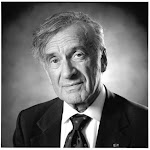
Upon arriving at the camp, Birkenau, the men, women, and children were ordered off the train and "herded" into the camp along a path lined with SS men, each holding a machine gun.
The first separation was separation by sex. Women went to the right, men to the left. Elie went with his father, leaving his mother and Tzipora for what he did not know would be the last time.
How horrifying it would have been to know that you would never see you mother again. Leaving your young sister to the hands of a cruel enemy would be one of the last thing I would want to be forced to do. Perhaps it is better that Elie did not know that he would never see the two again.
As the men were moved away from the women, they began to mix with inmates who had already been at Auschwitz for some time. These inmates were very angry, irritated, unruly, and aggressive, often shouting and striking the new arrivals, cursing their stupidity for every coming to such a place. The problem was the arrivals had not come of their own free will. They had just never heard of Auschwitz, even in 1944. Living far away in Transylvania, Hungary, they had not be exposed to the rumors and horror stories that circulated about the concentration camp. How could they ever believe that human beings were being burned alive in crematoriums at this day and age, babies being thown alive into burning infernoes. It was just too much to comprehend. After making their way to a crossways, each prisoner was examined by the infamous Doctor Mengele, separated by age and skill level. Elie had been told by a veteran inmate to claim that his age was 18, and doing so, he was kept with his father, this being a great relief for his strained nerves. Then as their group marches on, a man in the crowd informs them that they are headed for the crematorium. Elie's heart races and his faith is struck. Does he really have faith anymore in a God who he thought was loving. Now his faith is challenged and perhaps even for a short time, challenged. I think I will have to read more to determine the final outcome, but I have a feeling that his faith will eventually return.
The first night was one that Elie Wiesel will never forget. He describes the smoke, the children's faces, the consuming flames, the nocturnal silence, and the moments which he describes a having "murdered my God and my soul and turned my dreams to ashes." I too would have sleeping problems after having to endure such atrocities.
The next day they were ordered out of the barracks, stripped naked, marched to the barber where their heads were violently shaved, then marched to another barrack where they were randomly thrown prison garments. Those whose garments didn't fit traded with others as best they could. A event that strikes me as very moving is when Elie's dad suffers a colic attack and asks where the toilets are located, the German simply strikes him across the face. Elie realizes after his father crawls back to his position that he had not reacted, he had not retaliated against his fathers assailant. Had he changed that quickly? Now he had lost all former signs of aggression. He felt that he was becoming docile and submissive, for which he felt remorseful. After an endless session of waiting, Elie and his fellow inmates are marched out of the camp, taking a nice, slow-paced march toward the work camp, Auschwitz. Once they had arrived at the new camp, things began to start looking up. After a good night's sleep, the morale had greatly increased and their "veteran" inmates were not so brutal as their first encounters with others at the main gate. They were all given new clothing and then each one recieved a tattoo on their left forearm, signifiying their new names. Elie would be known as A-7713 from now on.
They now remained in Auschwitz for three weeks. Sleeping a lot in the morning in afternoon, life was fairly calm and laid back. Those who were not skilled workers only waited. Finally, when their numbers had dwindled down to around 100, their turn came and the block secretary announced that they would be leaving "with the next transport." At 10 o'clock, the SS guards rounded them up and marched them through a few German villages until they finally arrived at Buna, a new camp. As the last pasted into the camp, the "iron gate closed behind [them]."







.jpg)
